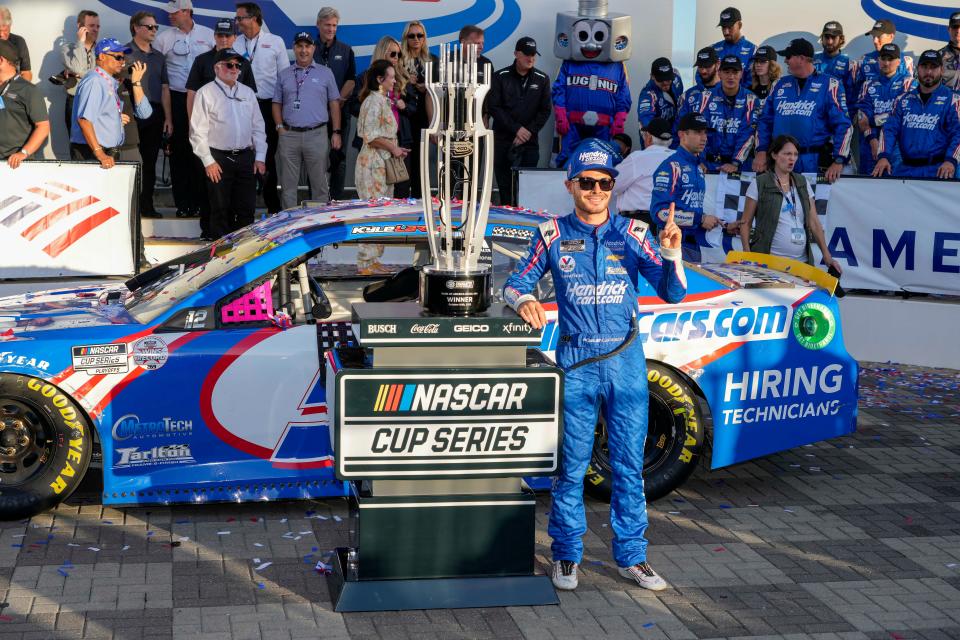NASCAR vowed to be more inclusive, but is its progress moving fast enough?
Mike Metcalf, one of the few Black men working on a NASCAR pit crew, knew what would come next. He saw how this would unfurl after Kyle Larson, then a driver on his Chip Ganassi Racing team, uttered the N-word during a live-streamed iRacing event in April 2020.
First, though, he felt the pain.
“It was a punch to the stomach, man,” Metcalf said. “Just lost your breath for a second.”
Larson lost his ride with Ganassi, NASCAR suspended him, and his team's championship hopes vanished — as Metcalf expected. NASCAR, a historically white, Southern sport, was suddenly forced to reckon with a culture that has historically excluded drivers and fans of color.
“People on ESPN and Twitter and all that were like, ‘Oh, yeah, well, of course, I'm sure that's how all those people talk,’ kind of referring to NASCAR,” Metcalf said.
“So, when this Kyle thing happened, it kind of woke NASCAR up a little bit to say, ‘OK, we need to do more.’ … And so (it’s) trying to make the garage a better place that's not just white, Southern male.”
Now, though, Larson is driving for the winningest Cup Series team ever, Hendrick Motorsports, and will be one of four drivers competing for the 2021 championship at Phoenix Raceway on Sunday. That raises obvious questions: Has anything actually changed in the last 18 months? Is NASCAR becoming more inclusive?
NASCAR and its leaders have said many of the right things and tout progress, but some people in the garage, fans and experts agree it still has a long way to go to back up that talk and generate real change.

****
The most outwardly noticeable action NASCAR took — both after Larson’s transgression and amid a broader discussion of racism in the U.S. — was banning flying the Confederate flag at races and events.
While NASCAR President Steve Phelps recently called that “the proudest day” for him as a leader, the driver who spearheaded the effort, Bubba Wallace, still thinks the flags are too prevalent among fans of the sport, particularly outside of racetracks.
“I don't know if there's a way to police that since it's not on their property,” Wallace said. “Just rolling in, people could be coming to the race for the first time, and they see that and they're like, ‘Eh, we're gonna keep driving.’ So, trying to eliminate those sightings as much as we can leading into a racetrack is big.”
Change, Phelps and the rest of NASCAR are finding, comes slowly. He acknowledged that, prior to the national outcry over a Minneapolis police officer murdering George Floyd in May 2020, racism was not something that resonated with some in racing.
“I would suggest before June of 2020, our industry wasn't ready, and that sounds awful,” Phelps said on the Champions of Change podcast, produced by RISE, which advocates for social justice in sports and partnered with NASCAR. “And I guess in some ways, I don’t feel great about that. … 18 months later now, it is the single most important decision we’ve made. And it's working. We have a brand-new fan base that's being welcomed by fans who have been fans of the sport for decades.”
Throughout the last 10 years, NASCAR’s fan base has become more diverse. In 2021, one out of four fans identifies as a person of color, compared with one out of five in 2011, according to research conducted by Nielson Scarborough.
Brandon Thompson, who became NASCAR’s vice president of diversity and inclusion in June 2020, called the banning of Confederate flags “a seminal moment” because “there’s never a wrong time to do the right thing.” Other efforts at increasing inclusion and broadening the appeal of the sport — both for fans and young drivers and pit crew members — have been less visible and the results more nebulous.
The employee councils, Thompson said, were designed so NASCAR employees could “speak candidly in a safe space” in the aftermath of Larson’s racist slur, civil rights protests around the world and the FBI’s investigation into a suspected hate crime against Wallace after his team found a noose in its garage stall at Talladega Superspeedway in June of 2020. If NASCAR wants to lead the industry to be more diverse, inclusive and equitable, it needs to start with its own practices as an employer, Thompson said.

